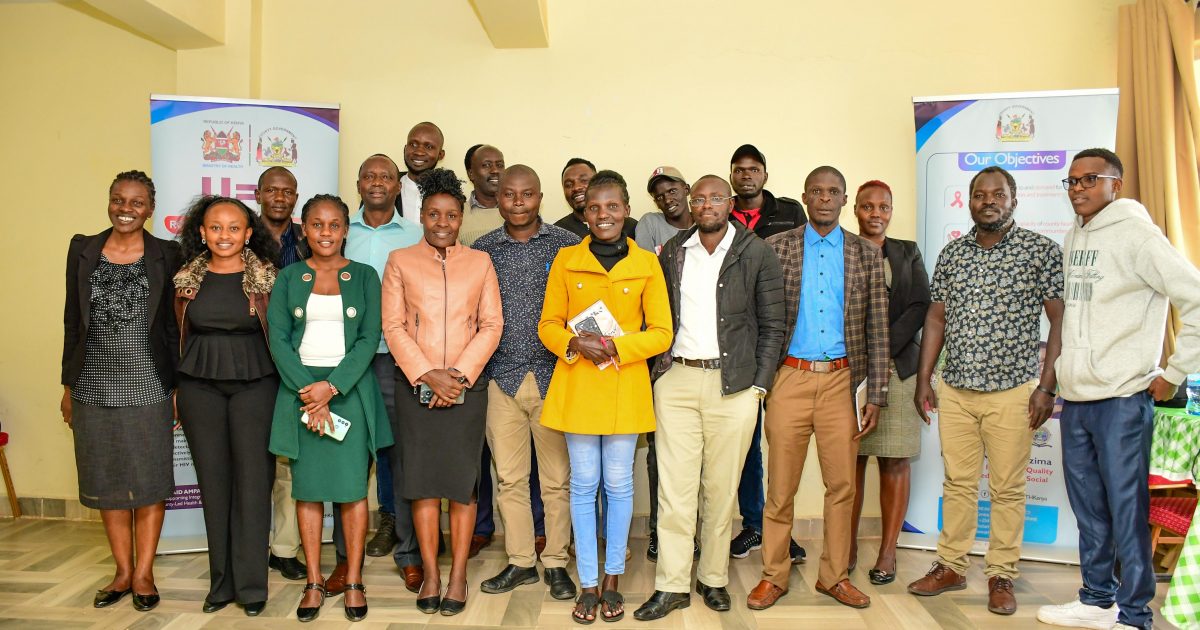USAID AMPATH Uzima calls for a stronger collaboration with media outlets and health-focused organizations in West Pokot County in the fight against HIV impact.
Dr. Samson Ndege, a technical advisor affiliated to the USAID AMPATH Uzima Program, who also serves as a lecturer at Moi University, emphasized the importance of engaging with journalists and information officers from the West Pokot County government to explore mutual opportunities.
“We recognize the invaluable role that local media outlets play in shaping public awareness and driving social change. By working together, USAID AMPATH Uzima can ensure that the people of West Pokot are better informed about health programs that can improve their lives,” said Dr. Ndege.
He highlighted how USAID AMPATH Uzima, in partnership with the Ministry of Health, plays a central role in providing essential HIV/AIDS services across the county which include prevention programs, counseling, treatment and support for individuals living with HIV/AIDS.
“We are committed to supporting the Ministry of Health’s efforts in combating HIV/AIDS through comprehensive care and prevention services,” said Dr. Ndege.
He emphasized the importance of local media in promoting the initiatives in the fight against HIV impact, noting that journalists significantly influence public attitudes toward HIV/AIDS by providing a platform for health-related content, they can help reduce stigma, educate the public and encourage individuals to seek care and treatment.
Dr. Ndege also encouraged journalists to focus on positive health stories, showcasing the success of HIV care programs, as a way to inspire hope and build confidence in available health services.
He highlighted a troubling trend of people becoming lost in follow-up saying that the individuals, who are enrolled in treatment programs, have either stopped attending health facilities or become untraceable hence hindering efforts to manage and support their care effectively.
“We are facing a real challenge with individuals who have become untraceable. After initially seeking treatment, we must find ways to track and re-engage these individuals to ensure that they continue receiving the care and treatment they need,” said Dr. Ndege.
Dr. Ndege also raised concerns over the number of people in remote areas who have not yet accessed HIV/AIDS testing services saying that despite ongoing efforts to increase awareness and provide mobile testing services, a significant portion of the population remains undiagnosed, leaving them vulnerable to the virus and unable to access essential care.
“We have seen that many people in hard-to-reach areas are still not accessing HIV testing services and without knowing their status, they cannot take advantage of prevention or treatment options,” he explained.
Dr. Ndege expressed concern over areas lacking both human and financial resources, which hinder the reach of vital HIV/AIDS prevention, testing and treatment services.
“Certain regions in the county remain underserved, and this is primarily due to a shortage of both human and financial resources,” Dr. Ndege stated.
However, Dr. Ndege reassured attendees that efforts are underway to collaborate closely with the county government to enhance outreach and improve service delivery.
He emphasized the need for more targeted interventions, especially for pregnant women, to prevent mother-to-child transmission of HIV.
“We must ensure that pregnant women receive proper antenatal care and are tested for HIV/AIDS,” Dr. Ndege said.
Dr. Ndege outlined that one of the most effective strategies in preventing mother-to-child transmission is early HIV testing during pregnancy, followed by immediate treatment for those who test positive, stressing that if these interventions are not implemented effectively, HIV transmission rates from mother to child could continue to pose a significant public health challenge.
“Targeting pregnant women with comprehensive antenatal care, including HIV testing, is a key priority for us and this will help prevent new infections and ensure that children are born HIV-free,” he added
Dr. Ndege revealed that approximately 4,000 individuals are currently receiving HIV care and treatment in the county emphasizing that the ultimate goal is not only to provide access to treatment but also to ensure that these individuals adhere to their treatment regimens consistently.
The doctor also noted a major achievement in the county’s HIV response saying that 95% of individuals affected by HIV in West Pokot have now been identified.
Despite this progress, Dr. Ndege highlighted that challenges remain, particularly in ensuring treatment adherence and overcoming barriers that may prevent individuals from accessing care regularly.
He called for continued efforts to improve follow-up services, support systems for those living with HIV, and community-based initiatives to reduce stigma and encourage more individuals to seek care.
Dr. Ndege concluded by reinforcing the importance of collaboration between health organizations, the Ministry of Health, the county government, and local media to ensure that the fight against HIV/AIDS continues to make strides in West Pokot, ultimately ensuring better health outcomes for the community.
By Anthony Melly and Agneta Chebet





